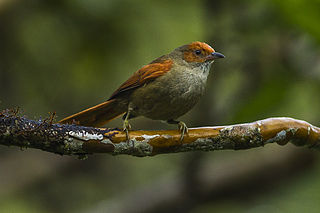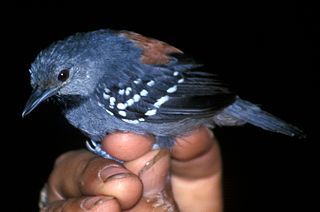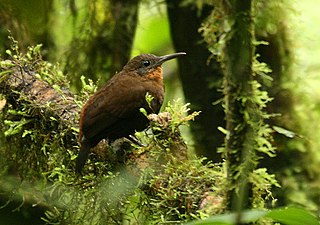
Quail is a collective name for several genera of mid-sized birds generally placed in the order Galliformes. The collective noun for a group of quail is a flock, covey, or bevy.

The black-fronted wood quail is a bird species in the family Odontophoridae, the New World quail. It is found in Colombia and Venezuela.

The Venezuelan wood quail is a bird species in the family Odontophoridae, the New World quail. It is found in the Venezuelan Coastal Range.

The Tacarcuna wood quail is a species of bird in the family Odontophoridae, the New World quail. It is found in Colombia and Panama.

The chestnut wood quail is a bird species in the family Odontophoridae, the New World quail. It is found only in Colombia.

The dark-backed wood quail is a bird species in the family Odontophoridae, which is the New World quail. It is found in Colombia and Ecuador.

The black-eared wood quail is a bird species in the order Galliformes. Until recently, the species was thought to be part of the family Phasianidae however DNA-DNA hybridization results determined that black-eared wood quail are only distantly related to Old World quail. As a result, black-eared wood quail have been placed in the family Odontophoridae and more specifically, in the category of wood quail.

The speckled chachalaca is a species of bird in the family Cracidae, the chachalacas, guans, and curassows. It is found in Bolivia, Brazil, Colombia, Ecuador, and Peru.

The grey-cheeked nunlet is a species of near-passerine bird in the family Bucconidae, the puffbirds, nunlets, and nunbirds. It is found in Colombia and Panama.

The Chocó poorwill is a species of nightjar in the family Caprimulgidae. It is found in Colombia and Ecuador.

The chestnut-headed crake is a species of bird in subfamily Rallinae of family Rallidae, the rails, gallinules, and coots. It is found in Bolivia, Brazil, Colombia, Ecuador, and Peru.

The Colombian crake is a species of bird in the subfamily Rallinae of the rail, crake, and coot family Rallidae. It is found in Colombia, Ecuador, and Panama.

The ochre-throated foliage-gleaner is a species of bird in the Furnariinae subfamily of the ovenbird family Furnariidae. It is found in Panama and every mainland South American country except Argentina, Chile, Paraguay, and Uruguay.

The red-faced spinetail is a species of bird in the Furnariinae subfamily of the ovenbird family Furnariidae. It is found in Colombia, Costa Rica, Ecuador, and Panama.

The ornate stipplethroat, formerly called the ornate antwren, is a species of bird in subfamily Thamnophilinae of family Thamnophilidae, the "typical antbirds". It is found in Bolivia, Brazil, Colombia, Ecuador, and Peru.

The chestnut-winged foliage-gleaner is a species of bird in the Furnariinae subfamily of the ovenbird family Furnariidae. It is found in Bolivia, Brazil, Colombia, Ecuador, Peru, and Venezuela.

The slaty-winged foliage-gleaner is a species of bird in the Furnariinae subfamily of the ovenbird family Furnariidae. It is found in Colombia, Ecuador, and Panama.

The grey-throated leaftosser is a Near Threatened species of bird in the subfamily Sclerurinae, the leaftossers and miners, of the ovenbird family Furnariidae. It is found in Bolivia, Brazil, Colombia, Costa Rica, Ecuador, Panama, Peru, Trinidad and Tobago, and Venezuela.

The chestnut-throated spinetail is a species of bird in the Furnariinae subfamily of the ovenbird family Furnariidae. It is mainly found in Bolivia, Brazil, Colombia, Ecuador, and Peru.

The dusky leaftosser or South American leaftosser is a bird in subfamily Sclerurinae, the leaftossers and miners, of the ovenbird family Furnariidae. It is found in Bolivia, Brazil, Colombia, Ecuador, French Giana, Guyana, Panama, Peru, Suriname, and Venezuela.























